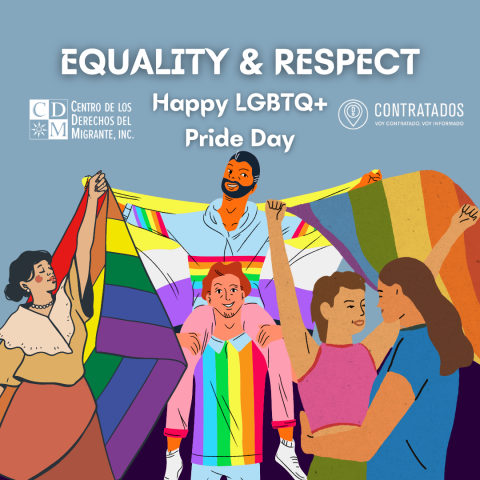June 28, 2022
LGBTQ+ workers and their rights against workplace discrimination

This June we celebrate the LGBTQ+ (Lesbian, Gay, Bisexual, Transgender, Queer) community and the advances and protections the community has won over the past several years. This is an opportunity to remember that two years ago, the U.S. Supreme Court decided that sexual orientation and gender identity are protected under Title VII, which prohibits employment discrimination on the basis of race, sex, color, religion, or national origin. The case, decided in June 2020, affirmed that employers cannot take discriminatory actions against employees because of their sexual orientation or gender identity.
Today, any working person in the United States can report any situation of discrimination or harassment in the workplace, regardless of immigration status. You have protections in your workplace against discrimination based on gender (male, female, or other), sexual orientation (lesbian, gay, bisexual, to name a few), or HIV status. You are also protected from discrimination in the workplace because of your race, ethnicity, color, national origin, pregnancy, religion, age, or disability. It is unlawful for your employer or supervisor to discriminate against you on the basis of any of the above characteristics. What is discrimination?
Discrimination means treating a person or group of people differently based on certain characteristics. In this case, we focus on discrimination based on gender, sexual orientation or HIV status.
Discrimination based on gender identity or sexual orientation can take many forms, but all are prohibited under U.S. anti-discrimination law. Depending on the circumstances, it may be illegal discrimination if at your job:
- You are denied a job because of your sexual orientation, gender, or because you are HIV positive;
- Your employer excludes you or treats you differently because of your sexual orientation, gender, or HIV status;
- Condition your admission to or tenure at your job on being “discreet” or if you must act as if you do not have your gender identity or sexual orientation;
- You are fired because of your sexual orientation, gender or HIV-positive status;
- You are paid less or excluded from certain benefits because of your sexual orientation, gender, or HIV status;
- You are called names, insulted or harassed in the workplace because of your sexual orientation, gender or HIV status.
What can I do if I experience any of the above?
If you are facing discrimination or harassment in your workplace, you generally have 180 working days to file a complaint. You can call the U.S. Equal Employment Opportunity Commission (EEOC) at 1-800-669-4000. You can also find contact information for your local EEOC office here.
Note: The EEOC does not accept charges of discrimination over the phone, but they can help you initiate the complaint process. It is important for you to know that this Act only applies to employers with 15 or more employees.
How has the LGBTQ+ community achieved these rights?
The LGBTQ+ movement has its roots in the United States, in New York City in 1969, when a group of LGBTQ+ people united against violence by the New York City police.
In the United States, advances in civil rights and LGBTQ+ rights not only benefit and protect members of the LGBTQ+ community, but all people working in the United States. That's why it's critical that, even if you don't identify as part of the LGBTQ+ community, you be an ally by sharing this information and making sure that no one in your workplace is discriminated against.
This blog is not legal advice. To enforce your rights, it is always advisable to consult with an attorney experienced in discrimination issues as soon as possible. To contact the Centro de los Derechos del Migrante for more information or free legal advice, call from Mexico: 800.590.1773.
Toll-free from the U.S.: 1.855.234.9699
Hours of operation are Monday through Friday from 9:00 a.m. to 5:00 p.m. (CT).
CDM WhatsApp: +52 5540745344
